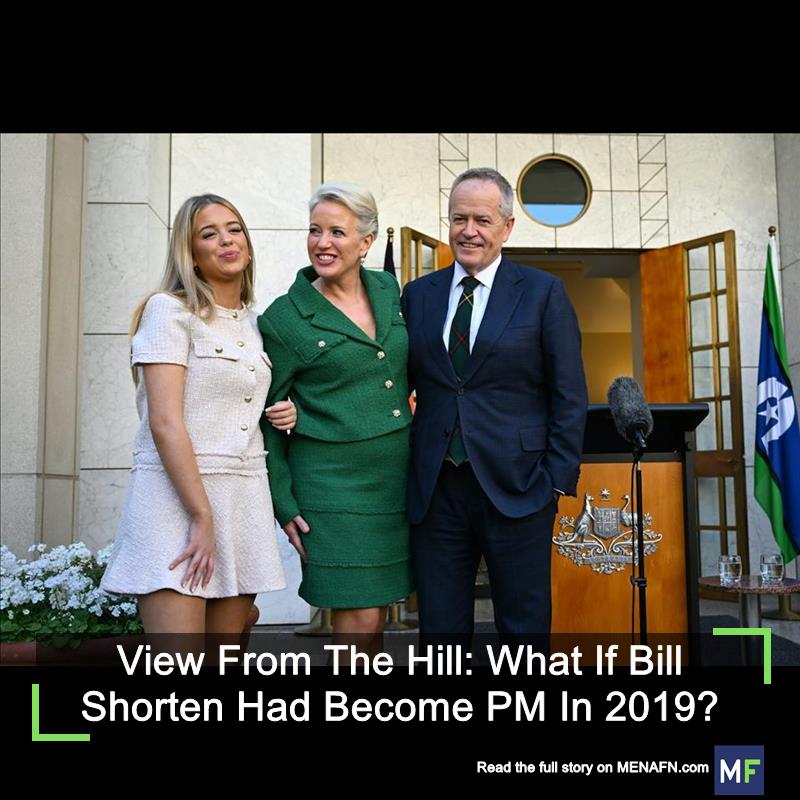
View From The Hill: What If Bill Shorten Had Become PM In 2019?
At the time, it seemed to most observers the unlosable election – until he lost it.
Events would have derailed a Shorten government, to a greater or lesser extent, just as they did the Morrison government.
Shorten would have had to manage the COVID pandemic. He'd probably have had smoother relations with the Labor states during the stresses COVID put on the federation. But there's no telling whether he'd have been more or less effective than Scott Morrison in grappling with the pandemic's multiple challenges. He'd have put in an economic support package as Morrison and his treasurer Josh Frydenberg did – it's unlikely he'd have spent more on it.
Shorten, from Labor's right, went to the 2019 election with an agenda much more radical and extensive than the 2022 so-called“small target” offering from Albanese, who's from the left. The heavy program, which would have had various“losers”, especially property investors, was a main factor in his defeat.
Pandemic aside, if Shorten as PM had proceeded with his program, there would have been a cutback on negative gearing, a measure that still has strong advocates. Its supporters believe our housing situation would be better as a result.
Bill Kelty, former ACTU secretary and a close confidant of Shorten, says that, pandemic permitting, a Shorten government would have brought significant changes on five fronts.
It would have reformed the tax system, he says, as well as implementing a broader-based positive industrial relations framework.
There'd have been a more independent defence policy. Obviously we would not have had AUKUS, which was a Morrison initiative. But Kelty believes Shorten, who is very pro-American, would have had some other fresh pact with the United States.
He says Shorten also wanted to establish a regional“parliament” to bring together Pacific island countries to deal with issues such as aid. Others say this goes further than Shorten intended, although he had a“Pacific as the blue continent” policy, with more aid and an Australian-led investment body.
On Indigenous affairs, Kelty says Shorten would not have had a referendum to put a Voice into the Constitution, but would have set out a pathway to a treaty.
Obviously a Shorten priority would have been the National Disability Insurance Scheme – he would have been able to start earlier on fixing it. As it is, he will be working flat out until he departs politics to embed the reforms he now has underway.
If Shorten had won the subsequent 2022 election and so been in power during the Middle East crisis, his government's policy would probably have been more pro-Israel than the Albanese government's.
In a Shorten government Tanya Plibersek would have been deputy prime minister and minister for education, instead of environment minister and on the outer, as she is in the Albanese government.
Chris Bowen would have been treasurer, and more contented than he looks as energy minister.
Jim Chalmers, as finance minister, would have had to endure a longer apprenticeship.
Albanese would have served for a time as infrastructure minister and then perhaps taken an overseas posting, something that didn't attract Shorten, who is headed for academia as vice-chancellor of the University of Canberra.
A Shorten win in 2019 would also have had big implications for the Liberals, beyond the obvious one of throwing them into opposition three years earlier than happened.
Scott Morrison's replacement as leader would likely have been Josh Frydenberg, although it might have been a close-run contest with Peter Dutton. A Frydenberg leadership would have given the Liberals a softer face compared with that under Dutton.
The Liberals'“women problem” would not have been as costly to the party as it came to be in Morrison's second term. The“teal” movement might still have emerged but probably not as strongly as it did.
Quite a few present and past political players dwell, from time to time, on such might-have-beens.
-
Bill Shorten
Scott Morrison
2019 federal election

Legal Disclaimer:
MENAFN provides the
information “as is” without warranty of any kind. We do not accept
any responsibility or liability for the accuracy, content, images,
videos, licenses, completeness, legality, or reliability of the information
contained in this article. If you have any complaints or copyright
issues related to this article, kindly contact the provider above.


















Comments
No comment